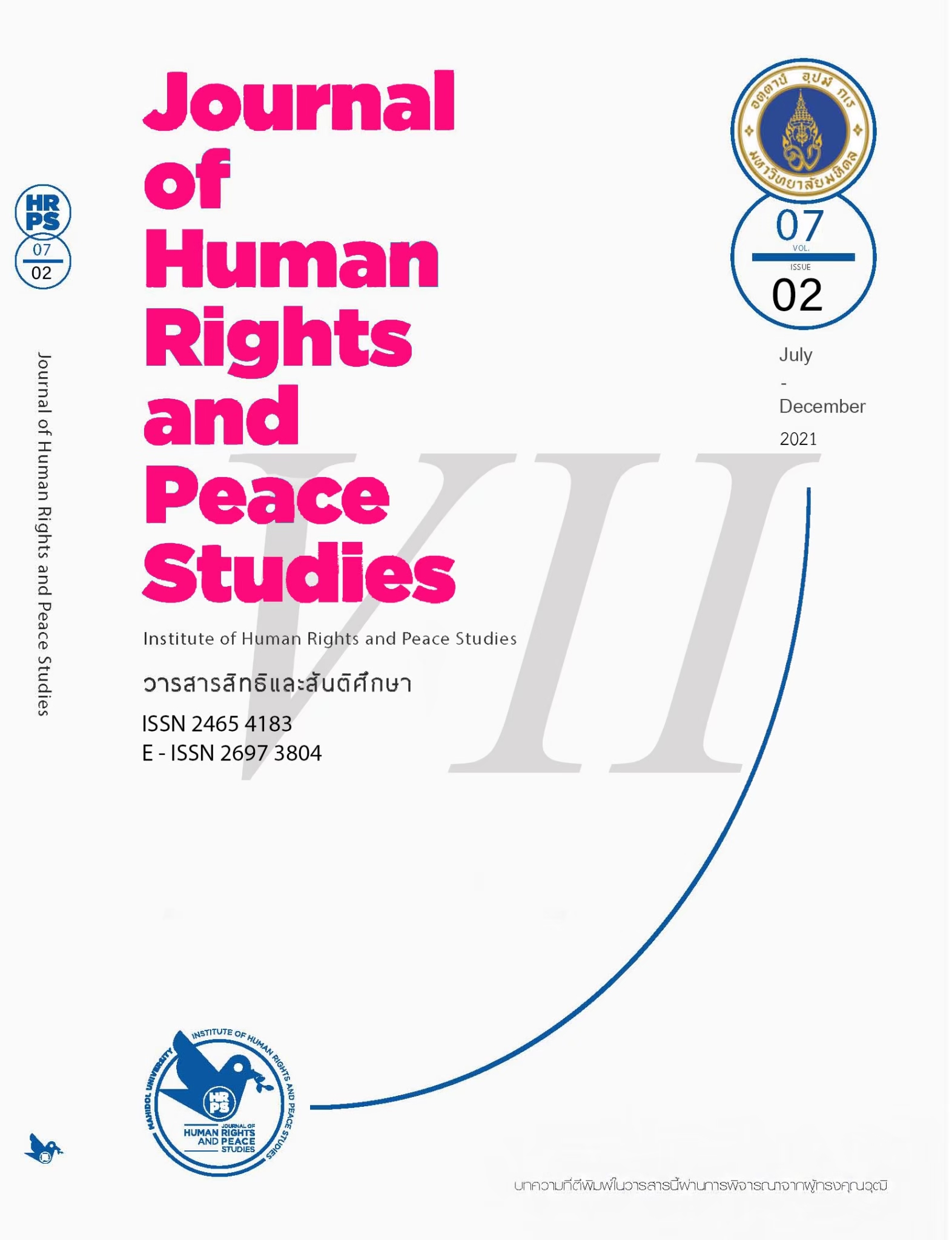Shamed Citizens: A Case Study on the Lived Experiences of Mature Vietnamese Queers
Main Article Content
Abstract
LGBTQ communities in Vietnam have recently made progress in terms of legal equality, public visibility, and social acceptance. Major historical events include the first Viet Pride (2012), decriminalization of same-sex wedding ceremonies (2013), and the revised Civil Code to allow trans* people to register under a new gender (2017). However, the “social evils” campaign, as a shaming mechanism through derogatory discourses, has been targeting sexual minorities for not conforming to social and cultural norms. This campaign, as a sign of state and public anxieties towards globalization, HIV epidemic and external influences, has not only marginalized and silenced mature queers, but also intensified the queer movement. Through this qualitative research, the author interviewed 65 LGBTQ individuals and allies, including both young and mature queers of Hanoi, Ho Chi Minh, and other cities. Focusing on those who were born before 1970 specifically, the author aimed to explore how the notion of shame characterizes the lived experiences of mature queers to give them voice and to document their lived experiences. While perceived to be passive, shamed citizens, and “silent supporters” of the movement, the author argues that shame has an empowering, transformative capability for mature queers as “decent citizens,” while young queers promote same-sex marriage, and civil and political rights through universal human rights standards. As one of a few communist nations in the world, this case study in Vietnam on advancing the rights of sexual minorities is unique not only in the ASEAN region, but also in the world.
Article Details

This work is licensed under a Creative Commons Attribution-NonCommercial-NoDerivatives 4.0 International License.
The views, opinions, and pictures expressed in this journal are those of the authors and do not necessarily reflect the opinions and viewpoints of the editor and the editorial board. All rights are reserved by the authors and the Institute of Human Rights and Peace Studies of Mahidol University. No part of this journal may be reproduced, stored in a retrieval system, or transmitted in any form or by any means without the prior permission in writing from the journal’s editor, or as expressly permitted by law, or under terms agreed with the appropriate reprographics rights organization. Non-commercial use of information in this journal must be properly referenced.
References
AFP. (2008, August 13). Diary aims to shed light on gay Vietnam. TaipeiTimes http://taipeitimes.com/News/world/archives/2008/08/13/2003420173.
Black, J.J.C. (2017). Queer male identities in modern Vietnamese literature[Doctoral dissertation,University of London].https://doi.org/10.25501/SOAS.00024338
Brown, M. (2009). LGBT aging and rhetorical silence. Sexuality Research & Social Policy:Journal of National Sexuality Research Center (NSRC), 6(4), 65-78. https://doi.org/10.1525/srsp.2009.6.4.65
Butler, J. (1993). Critically queer. Gay and Lesbian Quarterly, 1(1), 17-32. https://doi.org/10.1215/10642684-1-1-17
CDC National Prevention Information Network. (2002, April 19). Vietnam media call homosexuality “Social Evil,” vow crackdown. The Bodyhttps://www.thebody.com/tag/vietnam.
Choi, S.K., & Meyer, I.H. (2016). LGBT aging: A review of research findings, needs, and policy implications. The William Institute.
Earl, C. (2014). Vietnam’s new middle classes: Gender, career, and city. Nordic Institute of Asian Studies.
Foucault, M. (1997). “Friendship as a way of life,” The essential works of Foucault 1954-1984, Volume one.In P. Rabinow (Ed.). Ethics: Subjectivity and truth(pp. 135-140).The New Press.
Glenn, C. (2004). Unspoken: The rhetoric of silence. Southern Illinois University Press.
Gould, D. (2010). On affect and protest.InJ. Staiger, A.Cvetkovich, &A. Reynolds (Eds.),Political emotions: New agendas in communication(1sted., pp. 19-44).Routledge.
Greene, B.W. (1980). Toward a definition of the term third world. Boston College Third World Law Journal, 1(1), Article 10.
HelpAge International. (2015). AgeWatch Report Card. http://www.helpage.org/global-agewatch/population-ageing-data/country-ageing-data/?country=Viet%2BNam.
Horton, P., & Rydstrom, H. (2011). Heterosexual masculinity in contemporary Vietnam: Privileges, pleasures, and protests. Men and Masculinities, 14(5), 542-564.https://doi.org/10.1177/1097184X11409362
Human Rights Watch.(2018). Human Rights Report. https://www.hrw.org/asia/Vietnam.
Institute for Studies of Society, Economics and Environment, NextGen & LEA. (2018). Joint report on the human rights situation of the community of lesbian, gay, bisexual, transgender, and intersex in Vietnam for the third universal periodic review of Vietnam at Human Rights Council (2019). Office of the United Nations High Commissioner for Human Rights
Javaid, A. (2015). The sociology and social sciences of ‘evil’: Is the conception of pedophilia ‘evil’?”.Philosophical Papers and Review, 6(1), 1-9.https://doi.org/10.5897/PPR2014.0112
Mai, T.Y. (2016). Constructing the Vietnamese queer identities: A hierarchy of class, gender, and sexuality[Master’s thesis,University of Helsinki].
Ministry of Justice, Vietnam. (2009). The law on the elderly.http://moj.gov.vn/vbpq/en/lists/vn%20bn%20php%20lut/view_detail.aspx?itemid=10470
Munt, S.R. (2018). Gay shame in a geopolitical context. Cultural Studies, 33(2), 223-248. https://doi.org/10.1080/09502386.2018.1430840
Newton, N. (2012). A queer political economy of ‘community’: Gender, space and the transnational politics of community for Vietnamese lesbian (les) in Saigon. [Unpublished doctoral dissertation]. University of California.
Newton, N. (2014). Homosexuality and transgenderism in Vietnam. In M.McLelland &V.Mackie (Eds.), Routledge handbook of sexuality studies in East Asia.
Oakley, A. (1981). Interviewing women: Acontradiction in terms. In H.Roberts (Ed.), Doing feminist research(pp. 30-62). Routledge & Kagan Paul.
Office of the United Nations High Commissioner for Human Rights. (2016). Council establishes mandate on protection against violence and discrimination based on sexual orientation and gender identity. http://www.ohchr.org/EN/NewsEvents/Pages/DisplayNews.aspx?NewsID=20220.
Pham, P.Q., Le, B.Q. & Mai, T.T. (2012). Aspiration to be myself: Transgender people in Vietnam: Realities and legal aspects.iSEE.https://www.rosalux.de/fileadmin/images/Ausland/Suedostasien/Transgenders_report.pdf
Reich, W. (1970). Ideology as a material force.In W. Reich, The Mass Psychology of Fascism(pp. 3-33). Souvenir Press.
Takemoto, T. (2003). The Melancholia of AIDS:Interview with Douglas Crimp.Art Journal, 62(2), 81-90.https://doi.org/10.1080/00043249.2003.10792186
Taylor, C. (1994). The politics of recognition.In A. Gutmann, (Ed.),Multiculturalism(pp. 25-73). Princeton University Press.
Taylor, K.W. (2013). A history of the Vietnamese. Cambridge University Press.
Tomkins, S. (1995). Shame-Humiliation and Contempt-Disgust.InE.Sedgwick&A.Frank(Eds.), Shame and its sisters: A silvan tomkins reader(pp. 133-178). Duke University Press.
United Nations Development Programme & United States Agency for International Development. (2014). Being LGBT in Asia: Viet Nam Country Report.
Wambui, J. (2013). An introduction to feminist research. University of Nairobi.
Watts, B., Lloyd, C., Mowlam, A., & Creegan, C., (2008, April 1). What are today’s social evils?.Joseph Rowntree Foundation.


